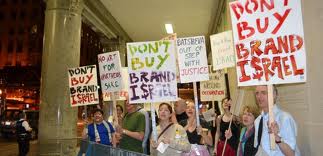Israel strives to re-brand image
by Ori Lewis and Ivan Karakashian, Reuters, 23 April 2009
"It doesn't matter how many times we convince ourselves and our staunch allies that we are not war criminals, and that those who try to portray us as such are incorrigible Jew-haters," wrote Anshel Pfeffer in the liberal daily Haaretz, Israel's public relations machine is "fighting a losing battle". "Perhaps it would be best to finally change tactics and admit that occupation of another nation has made it so much harder for us to claim we are still the heirs of the victims, and not the perpetrators."
JERUSALEM (Reuters) - A walkout by European diplomats in protest at Iran branding Israel a "racist" state at a U.N. racism conference was a morale boost for Israelis.

But the gesture of solidarity at the United Nations forum in Geneva was unlikely on its own to change perceptions on the streets of the West, where critics of Israel held mass protests during January's Gaza war.
Human rights groups and U.N. investigators accuse Israel of war crimes in the Gaza Strip during a 22-day offensive against Hamas-led Islamist militants in which Palestinians say more than 900 civilians died -- a figure Israel disputes.
Israel has rejected the charges. It says that no adequate ethical code of war exists for conflicts in which "amoral" adversaries use human shields with total indifference.
"A people which lost a third of its members, a third of its children to the Holocaust, does not forget, and must not be caught off-guard," President Shimon Peres said in a speech marking the killing of six million Jews and others by the Nazis.
Since its founding in 1948, Israel has placed a special emphasis on "Hasbara" a Hebrew word describing the drive to explain how its actions, whether military or diplomatic, are justified and meet the highest moral standards.
Yet Israel is inextricably associated with conflict and war, and perceived by some critics as arrogant and cruel in its treatment of the Palestinians and its creation of settlements on occupied land which are deemed illegal under international law.
"Unfortunately, perceptions of Israel have always been nasty," Israeli deputy Foreign Minister Danny Ayalon conceded in an interview. But he insisted it was "not Israel's doing."
"LOSING BATTLE"
In a bid to improve perceptions abroad, former foreign minister Tzipi Livni launched the "Brand Israel" initiative in October 2006. "It's time to bridge the gap between the real Israel and its international image," she said at the time.
Advocates hope the project is advanced by the new government of Prime Minister Benjamin Netanyahu and Foreign Minister Avigdor Lieberman, who is accused by Israeli Arabs of racism.
"I think people do not know Israel. They will see a very prosperous, vibrant and open society living under the rule of law," said Ayalon. "Branding Israel is a way to bring who we are, without the prisms of political agendas, to the masses."
On Monday, President Peres said: "Criticism of the Jewish State is also tinged with chilling anti-Semitism" a disease whose "cure is incumbent upon those who perpetrate it."
But some Israelis say anti-Semitism cannot explain everything.
"It doesn't matter how many times we convince ourselves and our staunch allies that we are not war criminals, and that those who try to portray us as such are incorrigible Jew-haters," wrote Anshel Pfeffer in the liberal daily Haaretz.
Israel's public relations machine is "fighting a losing battle," Pfeffer wrote. "Perhaps it would be best to finally change tactics and admit that occupation of another nation has made it so much harder for us to claim we are still the heirs of the victims, and not the perpetrators."
Veteran diplomat Ayalon said the Jewish state faces an uphill struggle at the United Nations where 57 Muslim states form "an automatic majority against Israel, because of politicization."
Israel wants to change the impact made on ordinary people.
Jennifer Laszlo Mizrahi, president of The Israel Project, sends information and contacts to some 7,000 across the Arab world who receive regular e-mails in Arabic.
"They are using our information," she said. "If there is a 30-minute piece on Al Jazeera and we can get in four minutes that are fair, we feel that it is an enormous victory for the possibility of a better future."
"When people have a better understanding of who we are, then they understand our actions in Gaza better," said Ido Aharoni of the foreign ministry, who heads the Brand Israel project.
But the idea that a campaign can achieve this is challenged by some.
"Branding per se is good for a country like the UK or Sweden or Australia ... they have no problems," said Rommey Hassman, lecturer at the Interdisciplinary Center in Herzliya.
"It's not good for countries who have conflicts ... who have an image problem. I don't think it's going to work."
Original article at Reuters, 23 April 2009
